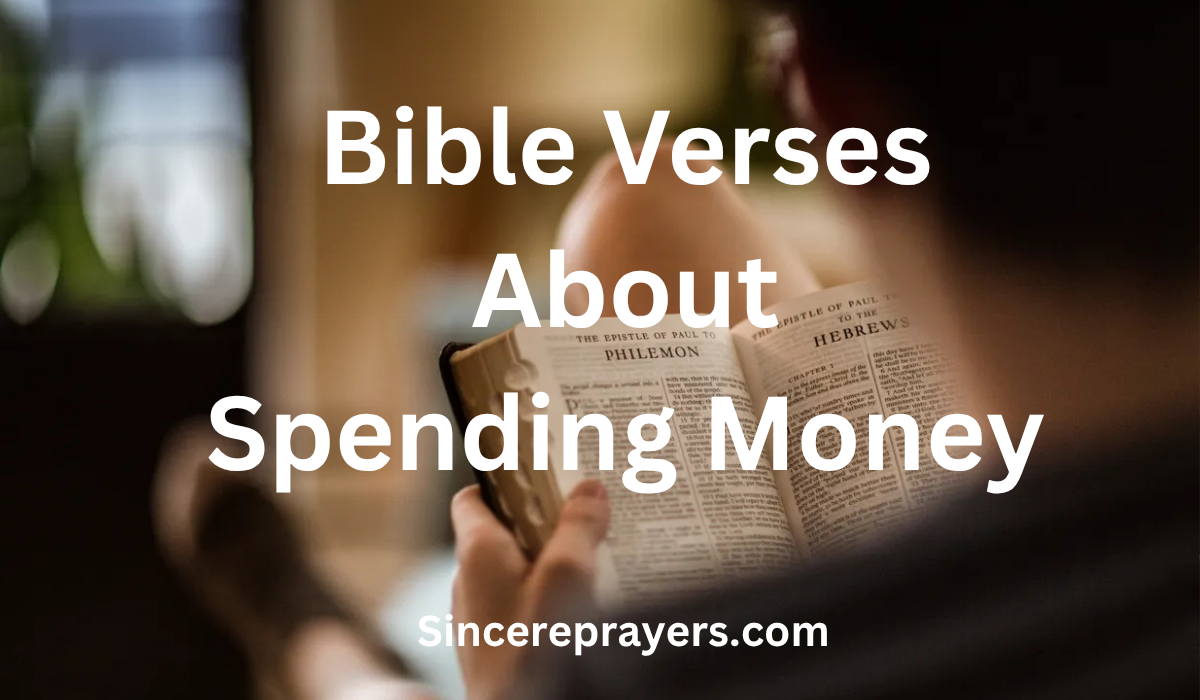Since our use of money reflects our inner values, it is one of the most discussed issues in the Bible. Although spending money is not always bad, God is interested in the mindset, discernment, and priorities that guide our financial decisions. Scripture offers timeless guidelines that help believers avoid greed, spend sensibly, and utilize money as a means of stewardship and charity.
In the modern world, it’s simple to become caught up in debt, reckless spending, or the pursuit of wealth for personal benefit. The Bible verses about spending money reminds us that true fulfillment does not come from worldly stuff, despite the fact that advertisements and social forces urge us to associate items with success. Rather, God asks us to financial responsibility, stewardship, and satisfaction. Spending need to be in line with God’s plans and show appreciation for what He has provided.

Additionally, the Bible teaches that money is a resource that has been handed to us rather than an end in itself. Jesus frequently spoke against the perils of having an idolatrous attachment to money. In addition to meeting our own requirements, prudent spending puts us in a position to bless others, advance God’s kingdom, and live stress-free from financial servitude. When used wisely, spending can glorify God.
You can better comprehend how God wants His children to handle money by reading these 35 insightful Bible verses about spending money. Every verse includes a commentary to help you understand how it relates to decisions you make on a daily basis, such as budgeting, contributing, or avoiding wasteful spending. As you read these verses, allow them to push your perspective on money and encourage you to spend in ways that honor God and create enduring peace.
35 Insightful Bible Verses About Spending Money in 2025
1. Proverbs 21:20
“The wise store up choice food and olive oil, but fools gulp theirs down.”
This verse emphasizes the importance of saving and being thoughtful with resources rather than wasting them quickly. Wise spending includes planning for the future and exercising discipline, while reckless spending often leads to lack and regret. God values stewardship and foresight, reminding us that wisdom is displayed in how we manage even the small things. Spending without thought can drain blessings, but careful management creates stability and sustainability for the long term.
2. Matthew 6:21
“For where your treasure is, there your heart will be also.”
This verse highlights the deep connection between money and our spiritual priorities. How and where we spend reflects what we value most. If we consistently invest in temporary pleasures, our hearts will drift toward materialism. However, when we use money for eternal purposes—such as helping others or supporting God’s work—it reveals a heart focused on Him. Spending money wisely becomes a form of worship, aligning our desires with God’s kingdom.
3. Hebrews 13:5
“Keep your lives free from the love of money and be content with what you have.”
This verse reminds us that money is not the source of true security or joy. The temptation to spend excessively often comes from discontentment or envy. Instead, God calls us to find satisfaction in His presence and provision. By keeping our hearts free from greed, we can resist impulsive or wasteful spending. Contentment allows us to enjoy what we have and spend wisely without constantly chasing after more.
4. Proverbs 22:7
“The rich rule over the poor, and the borrower is slave to the lender.”
Debt can be a heavy burden, often resulting from careless spending or living beyond one’s means. This verse warns about the dangers of borrowing without wisdom, as it can lead to financial bondage. God desires His people to live in freedom, not under the weight of debt. Spending responsibly means avoiding unnecessary borrowing and learning to live within our means, trusting God’s provision rather than relying on loans or credit.
5. 1 Timothy 6:10
“For the love of money is a root of all kinds of evil.”
This verse is often misunderstood—it does not say money itself is evil, but the love of money is. Overspending and reckless financial decisions often stem from a heart consumed by greed. When money becomes an obsession, it leads to harmful choices and misplaced priorities. God calls us to spend responsibly, ensuring that our financial habits are driven by wisdom and generosity, not by an unhealthy attachment to wealth or possessions.
6. Luke 12:15
“Watch out! Be on your guard against all kinds of greed; life does not consist in an abundance of possessions.”
Jesus reminds us that life’s value is not measured by material wealth or possessions. Overspending often flows from greed, trying to find fulfillment in things rather than in God. This verse challenges us to evaluate whether our spending reflects contentment or covetousness. True life and satisfaction come from knowing Christ, not accumulating material goods. Wise spending is therefore rooted in guarding our hearts against greed and focusing on eternal treasures.
7. Ecclesiastes 5:10
“Whoever loves money never has enough; whoever loves wealth is never satisfied with their income.”
The pursuit of wealth through endless spending is a cycle that never brings satisfaction. This verse reveals the emptiness of materialism—those who love money are never content. Spending excessively in hopes of fulfillment always leaves the heart restless. Instead, God calls us to steward what we have with gratitude. Contentment comes not from how much we spend, but from trusting God’s provision and living within the boundaries of wisdom and moderation.
8. Proverbs 13:11
“Dishonest money dwindles away, but whoever gathers money little by little makes it grow.”
This verse teaches the importance of honesty and patience in financial matters. Quick and reckless spending often depletes resources, but careful, steady management brings growth. God honors integrity in our financial dealings, and spending wisely reflects trust in His principles. Rather than chasing instant gratification or riches, He encourages diligence and moderation. Little by little, wise spending and saving bring stability, while dishonesty and wastefulness lead to eventual loss and hardship.
9. Proverbs 11:24
“One person gives freely, yet gains even more; another withholds unduly, but comes to poverty.”
Generosity in spending brings unexpected blessings, while selfish hoarding leads to emptiness. This verse shows that wise financial habits include giving freely when God prompts us. Spending should not be solely about ourselves, but also about serving others. When we give, God often provides in return, ensuring our needs are met. The paradox of generosity is that in blessing others, we are enriched spiritually and often materially, reflecting God’s economy of abundance.
10. 1 Corinthians 16:2
“On the first day of every week, each one of you should set aside a sum of money in keeping with your income.”
This verse points to intentional financial planning, especially regarding giving. Paul encourages believers to set aside money regularly for God’s work. Instead of spending impulsively, this discipline reminds us to prioritize God in our finances. Wise spending includes budgeting, planning, and making space for generosity. By setting aside first for God’s kingdom, we align our hearts with His purposes and ensure our financial habits glorify Him through consistent and thoughtful stewardship.
11. Proverbs 28:20
“A faithful person will be richly blessed, but one eager to get rich will not go unpunished.”
This verse warns against reckless financial pursuits rooted in greed. Eagerness to spend or gain wealth quickly often leads to poor decisions and consequences. A faithful steward, however, manages money with patience, integrity, and moderation, which leads to lasting blessings. Spending wisely demonstrates faithfulness to God’s principles, while chasing riches through impulsive spending brings regret. God values consistent and faithful stewardship over reckless ambition or financial shortcuts.
12. Luke 16:11
“So if you have not been trustworthy in handling worldly wealth, who will trust you with true riches?”
Jesus highlights that money management reflects our readiness for greater spiritual responsibilities. If we are careless in spending and wasteful with money, how can God entrust us with more? This verse emphasizes stewardship: money is temporary, but how we use it reveals our faithfulness. Wise spending honors God and prepares us for eternal blessings, while careless spending shows neglect of both earthly and spiritual trust.
13. Proverbs 17:16
“Why should fools have money in hand to buy wisdom, when they are not able to understand it?”
This verse shows the futility of reckless spending without wisdom. Money in the hands of a fool is wasted because it is not guided by understanding. Wise spending requires discernment, priorities, and alignment with God’s will. Many chase after things that do not satisfy, but God calls us to use resources with purpose. This verse reminds us that wisdom, not wealth, is the key to meaningful financial choices and true prosperity.
14. Isaiah 55:2
“Why spend money on what is not bread, and your labor on what does not satisfy?”
God challenges His people not to waste money on things that lack true value. Much of overspending is chasing temporary satisfaction that fades quickly. Instead, God invites us to invest in what nourishes our souls and aligns with His will. This verse is a call to evaluate our spending habits, ensuring that money is used for lasting fulfillment, not wasted on fleeting pleasures or empty pursuits.
15. Philippians 4:19
“And my God will meet all your needs according to the riches of his glory in Christ Jesus.”
This verse reminds us that God is the ultimate provider of our needs. Overspending often stems from fear of lack or striving to meet needs on our own. Trusting in God’s provision allows us to spend wisely, without anxiety or excess. When we believe He will supply, we can live within our means, avoid wastefulness, and rest in His faithfulness. Spending responsibly flows from trusting God’s promise to provide.
16. Proverbs 3:9–10
“Honor the Lord with your wealth, with the firstfruits of all your crops; then your barns will be filled to overflowing.”
This verse emphasizes that our spending should begin with honoring God. By giving Him the first portion of our income, we acknowledge Him as our provider. Spending is not just about meeting personal needs but also about prioritizing God’s kingdom. When we honor Him financially, He promises to provide abundantly. Wise spending, therefore, involves generosity toward God, ensuring that our resources are first directed to His work before anything else.
17. Proverbs 14:23
“All hard work brings a profit, but mere talk leads only to poverty.”
This verse shows the connection between diligence and financial stability. Wise spending begins with earned income, and God blesses honest labor. Reckless spending without responsibility or effort leads to financial ruin. Our approach to money should reflect diligence, discipline, and purpose. Spending wisely means not wasting the fruit of our labor but using it to provide for needs, help others, and build a future rooted in God’s principles of stewardship and responsibility.
18. Malachi 3:10
“Bring the whole tithe into the storehouse, that there may be food in my house. Test me in this,” says the Lord Almighty.
This verse teaches about faithful giving as an essential part of financial stewardship. God challenges His people to trust Him with their resources by bringing tithes. Spending money wisely includes prioritizing giving, which opens the door for God’s blessings. Instead of clinging tightly to wealth, this verse calls us to release it back to Him in faith. Wise spending reflects trust in God’s promises, knowing He rewards cheerful and faithful generosity.
19. 1 Timothy 6:17
“Command those who are rich in this present world not to be arrogant nor to put their hope in wealth.”
Paul instructs that money should never be our source of pride or security. Overspending often reveals misplaced hope in material wealth. Instead, God calls us to humility and dependence on Him, recognizing that He is the true source of provision. Spending wisely means avoiding arrogance or extravagance and using resources with gratitude. Wealth is fleeting, but when handled responsibly, it can glorify God and bless others without controlling our hearts.
20. Proverbs 19:17
“Whoever is kind to the poor lends to the Lord, and he will reward them for what they have done.”
This verse highlights the eternal value of generosity in spending. Helping the poor is seen as lending to God Himself, who promises to repay. Spending wisely includes directing money toward those in need, reflecting God’s heart of compassion. Instead of hoarding wealth or using it solely for self, believers are called to share. Every act of generosity becomes an investment in eternity, carrying God’s assurance of blessing and reward for faithful stewardship.
21. Matthew 6:24
“You cannot serve both God and money.”
Jesus makes it clear that money can easily compete with God for our loyalty. Overspending and reckless financial habits often reveal when money has become an idol. This verse reminds us to evaluate whether our spending patterns show devotion to God or love for material gain. Wise spending places God at the center, ensuring that money remains a servant, not a master. Choosing God over money leads to freedom and true fulfillment.
22. Proverbs 27:23–24
“Be sure you know the condition of your flocks, give careful attention to your herds; for riches do not endure forever.”
This verse teaches the importance of financial awareness and planning. In biblical times, flocks and herds represented wealth, but today this translates into managing resources carefully. Reckless spending ignores the future, while wise stewardship requires knowing where our money goes. God calls us to budget, track expenses, and plan wisely. Riches are temporary, but careful financial management ensures stability and reflects responsibility toward what God has entrusted us with.
23. Psalm 37:21
“The wicked borrow and do not repay, but the righteous give generously.”
This verse contrasts two attitudes toward money—selfishness versus generosity. Overspending often leads to debt and neglect of repayment, which is considered unrighteous. The righteous, however, not only avoid reckless debt but also live generously, blessing others. Wise spending means living within one’s means, honoring obligations, and practicing generosity. God calls us to integrity in financial matters, using money to help others rather than becoming enslaved by careless borrowing.
24. Proverbs 10:22
“The blessing of the Lord brings wealth, without painful toil for it.”
This verse shows that true prosperity comes from God, not from reckless spending or constant striving. When we honor Him, He provides in ways that do not bring sorrow. Overspending often leads to regret, but blessings from God bring peace and joy. Wise financial habits align with His guidance, allowing us to enjoy provision without anxiety. Spending responsibly reflects trust in God’s blessings rather than restless striving for wealth.
25. Acts 20:35
“It is more blessed to give than to receive.”
Paul reminds believers of Jesus’ teaching that generosity outweighs selfish gain. Spending money should not only be for personal enjoyment but also for blessing others. Giving brings joy, freedom, and lasting impact, while self-centered spending leads to emptiness. Wise spending prioritizes generosity, recognizing that in giving, we reflect Christ’s love. This verse challenges us to see spending not just as consumption but as an opportunity to bless others in meaningful ways.
26. Proverbs 12:11
“Those who work their land will have abundant food, but those who chase fantasies have no sense.”
This verse highlights the importance of diligence and responsibility in financial matters. Reckless spending often stems from chasing get-rich-quick schemes or unnecessary luxuries. God values consistent effort and wise use of resources, which leads to stability and provision. Wise spending reflects careful planning, honest labor, and realistic priorities. Chasing fantasies, however, wastes money and energy, leaving one empty. God blesses faithful effort far more than reckless financial pursuits.
27. Matthew 19:21
“If you want to be perfect, go, sell your possessions and give to the poor, and you will have treasure in heaven.”
Jesus challenges the rich young ruler to loosen his grip on wealth. This verse shows that spending money is not just about earthly comfort but about eternal investment. While not everyone is called to sell everything, we are all called to generosity and kingdom-minded spending. Possessions can hinder spiritual growth when they own us. Wise spending prioritizes eternal treasures, ensuring that our hearts remain devoted to Christ above material wealth.
28. Proverbs 15:16
“Better a little with the fear of the Lord than great wealth with turmoil.”
This verse reminds us that peace with God is far greater than riches gained through reckless or selfish spending. Having less but living in contentment and godliness is more valuable than having much with constant stress and conflict. Overspending often brings turmoil, but wise financial stewardship brings peace. God calls us to prioritize Him above wealth, teaching us that spiritual riches outweigh material abundance every time.
29. Luke 14:28
“Suppose one of you wants to build a tower. Won’t you first sit down and estimate the cost?”
Jesus uses this example to illustrate the value of planning and counting the cost before taking action. This principle applies directly to spending: wise financial decisions require budgeting and forethought. Reckless spending without planning leads to regret and lack. God desires us to be thoughtful in how we use money, ensuring that our spending choices are sustainable and responsible, reflecting wisdom and foresight in all areas of life.
30. James 5:5
“You have lived on earth in luxury and self-indulgence. You have fattened yourselves in the day of slaughter.”
This verse warns against selfish and excessive indulgence. Reckless spending driven by luxury and greed leads to spiritual emptiness and eventual judgment. God calls us to moderation, generosity, and responsible living, not indulgence at the expense of others. Spending wisely means avoiding unnecessary excess and instead focusing on meaningful and godly uses of money. True joy comes not from indulgence, but from living generously and responsibly under God’s guidance.
31. Colossians 3:2
“Set your minds on things above, not on earthly things.”
This verse calls believers to prioritize eternal values over temporary possessions. Overspending often reflects a fixation on earthly things that do not last. God desires us to set our hearts on Him, using money in ways that honor His kingdom rather than simply indulging in material desires. Spending wisely flows from a heavenly perspective, reminding us that everything we buy should reflect eternal purpose and glorify God.
32. Psalm 62:10
“Though your riches increase, do not set your heart on them.”
God warns His people not to let wealth capture their hearts, even when prosperity comes. Spending recklessly often shows misplaced priorities and attachment to riches. This verse encourages us to handle money responsibly, without allowing it to control us. Wise spending reflects humility, gratitude, and faithfulness, recognizing that money is temporary and should never define us. Our hearts belong to God, not to the fleeting comfort of financial abundance.
33. 2 Corinthians 9:7
“Each of you should give what you have decided in your heart to give, not reluctantly or under compulsion.”
This verse teaches that giving is an intentional and joyful act, not something forced. Spending wisely includes creating room for generosity in our finances. God loves a cheerful giver, meaning our spending should reflect joy in blessing others rather than reluctance. This verse encourages believers to budget intentionally for generosity, aligning money management with God’s purposes. Wise financial habits prioritize giving that comes from the heart, honoring God and serving others freely.
34. Deuteronomy 8:18
“But remember the Lord your God, for it is he who gives you the ability to produce wealth.”
This verse reminds us that everything we earn and spend ultimately comes from God. Reckless spending often stems from forgetting that wealth is a gift from Him, not our own achievement. Wise stewardship begins with humility, acknowledging God as the source of provision. Spending responsibly honors Him, recognizing that money is a trust to be used wisely. Gratitude and dependence on God should guide every financial decision we make.
35. Matthew 6:33
“But seek first his kingdom and his righteousness, and all these things will be given to you as well.”
This verse teaches that financial priorities should flow from seeking God above all else. Overspending often comes from anxiety about provision or misplaced priorities. Jesus assures us that when we put God first, He supplies our needs. Wise spending starts with a kingdom-first mindset, ensuring that money supports spiritual growth and godly purposes. By seeking Him, we find balance, peace, and provision without reckless or anxious spending.
Conclusion
Although money is a powerful tool, it must be used with discernment, self-control, and a God-honoring mindset. The Bible makes it quite evident that our spending habits reveal our values and priorities. While prudent financial management shows obedience and faith, excessive spending, debt, and greed are signs of mistaken confidence. Planning ahead, abstaining from needless indulgence, and allocating resources in ways that align with God’s eternal purposes are all components of prudent money management.
We are reminded by the verses we have studied that money should never rule us. God has given us the responsibility of serving others, providing for their necessities, and advancing His kingdom. Spending sensibly frees us from financial servitude, fosters contentment, and puts us in a position to live frugally. Biblical principles may govern every financial decision, whether it is about budgeting, saving, or giving.
In the end, genuine contentment and safety originate from our relationship with God rather than from the money we spend. We are free from worrying about money when we put our faith in Him as our provider and prioritize His kingdom. Living faithfully and making good use of what He has given us with purpose and thankfulness is what it means to spend wisely, not to be legacious. May your financial decisions bring serenity, stability, and long-lasting effects for God’s glory as you put these biblical teachings into practice.





